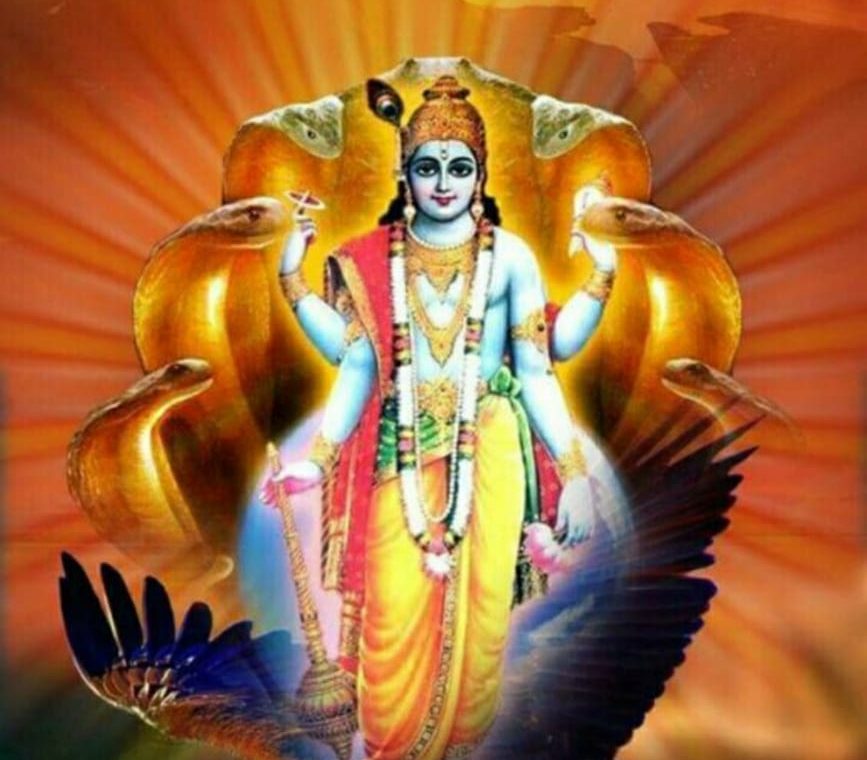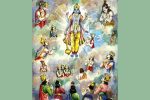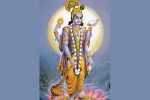NAME 36
Īśvaraḥ ईश्वरः
Īśvara means the master. This nāma says that Viṣṇu is the master of the universe.
As per Sāṃkhya philosophy, Īśvara is the stage of attainment of knowledge. There is difference between the Brahman and Īśvara. Brahman is incomprehensible. Brahman is realised only through His power of projection known as Īśvara. It is only Īśvara, who helps the souls to evolve. In other words, Īśvara is the Brahman with attributes. The Brahman with attributes is known through various names and forms for the convenience of visualization.
The following explanation by Gabriel Pradiipaka will explain the difference between Brahman and Īśvará. “Īśvará is the one who is in the middle of the hassle caused by Prakṛti. This Īśvará is a superposition on Bráhma according to Advaita, or else, He is the Lord of all, according to Dvaitá. Bráhma has no matter and therefore, no Prakṛti can be contained in Him. Bráhma is not the container of anything. In your experience, the subject experiencing the making of Prakṛti is the jīvá or individual soul, who is āatmā (who is Bráhma) finally. The main difference between Advaita and Dvaitá is that Advaita says that only Bráhma is real, while Dvaitá brings the duality of “the Lord and the individual souls”. If you perceive that you don’t exist, but only Bráhma exists, you are experiencing what Saṃkarācārya experienced. If you perceive that you are an individual soul in the middle of the creations of His Prakṛti (of the Lord), you are perceiving what Mádhvācārya perceived.” (Brahma here means the Brahman)
Please watch to see “What is God?”
३६. ॐ ईश्वराय नमः।
36. Om Īśvaray Namah
Isvarah
a) One who has the supreme power of control over all beings.
b) One who has the ability to do anything without the help of any other beings or things
INTERPRETATION GUIDED BY SANT VANI (WORDS OF SAINTS)
Īśvarah – The one with unlimited lordship.
He is the Paramesvara. Aiśvarya is isvarasyabhavah, lordship, that is the nature of Īśvara. Even a CEO may have a board of directors to report to. Overlordship means there is no one else who lords over Īśvara.
Lord Viṣṇu is the Lord of all lords like Brahmaji, Indra and so on who gain an upadhi, (a conditioning adjunct which has a function) and that power as a result of their previous karma. But, Lord Visnu being the karma-phala-dāta, does not need an upadhi.. Therefore, He has the aiśvarya, the power to lord over all, without any upadhi. He stands in His own glory and His aiśvarya, lordship, is not subject to any limitation.
For the sake of understanding, there are two types of aiśvarya. One is an aiśvarya because of the upadhi and is known as sopadhika-aisvarya. Īśvara is sarvajñatva, sarvaśaktimatva,
sarvavyāpakatva–being all-knowing, almighty and all-pervasive and so on, is due to His māyā-upādhi, his maya shakti and hence it is sopadhika-aiśvarya. The other is an aisvarya without upadhi and is nown as nirupādhika- aiśvarya. Without the maya-upadhi, He is ‘satyamjñanamanantam brahma.’, that consciousness which cannot be negated.
Awareness of Īśvara is not simply thinking of Krishna. It is not simply thinking of the murti in the morning and then putting him in the cradle and rocking him to sleep at night. If you forget Krishna the next morning, you might feel guilty and say Krishna is angry at me. You are just putting your own projections on Krishna. To relate to Īśvara to is to be aware of his presence in all situations.
Thus, He is Sambhava–takes forms out of His own will, because He is Bhāvana–the giver of karma-phala. He is Bhartā–the sustainer and is Prabhava–the source of everything needed for sustenance. The names Prabhu and Īśvara show, that He has the capacity to sustain without depending on anything else.
Now, for us to gain oneness with such an Ishwar what is required?
Listen to all the three videos in its entirety and meditate on its essence while trying to inculcate the learning in our lifes.



